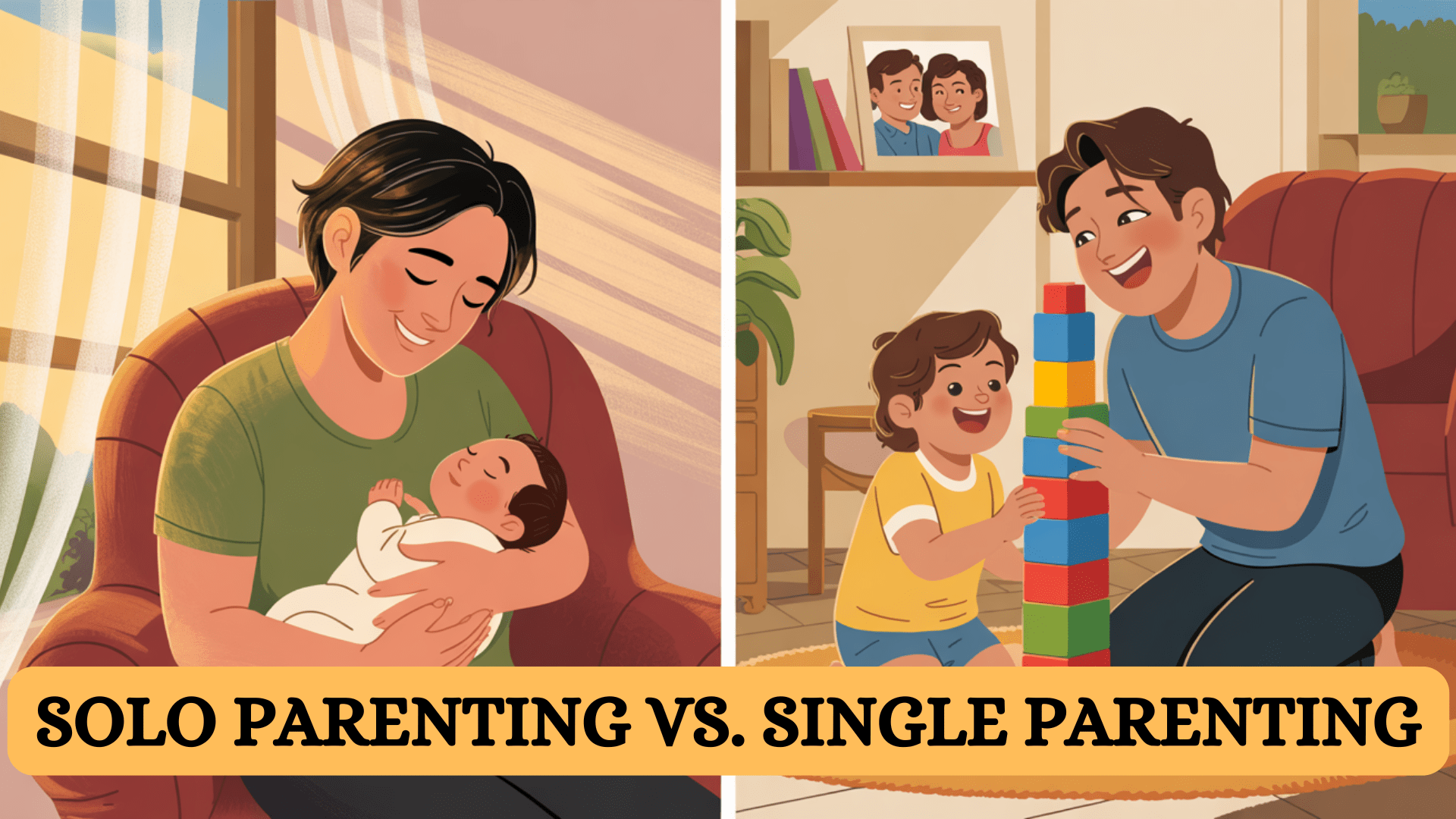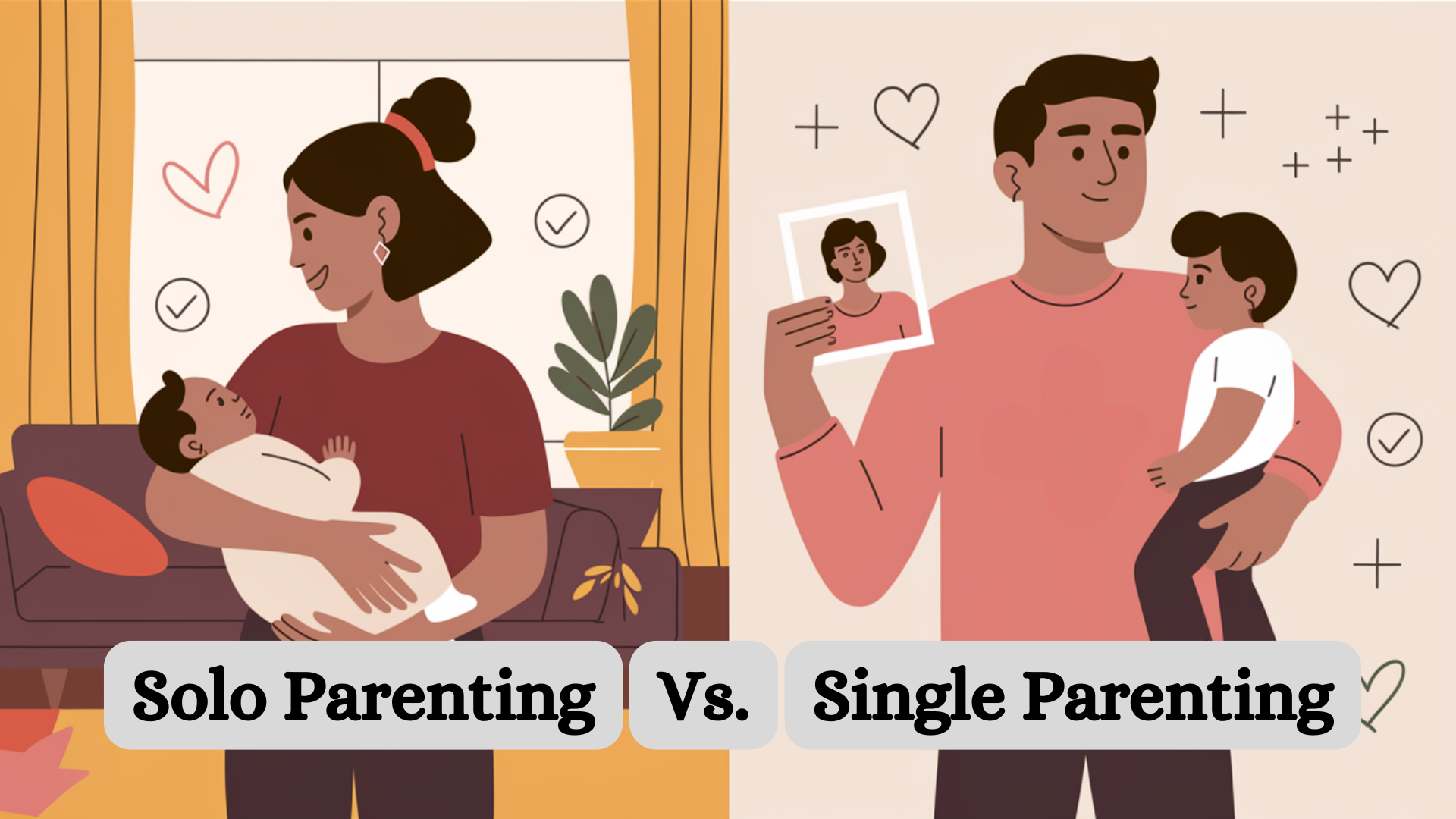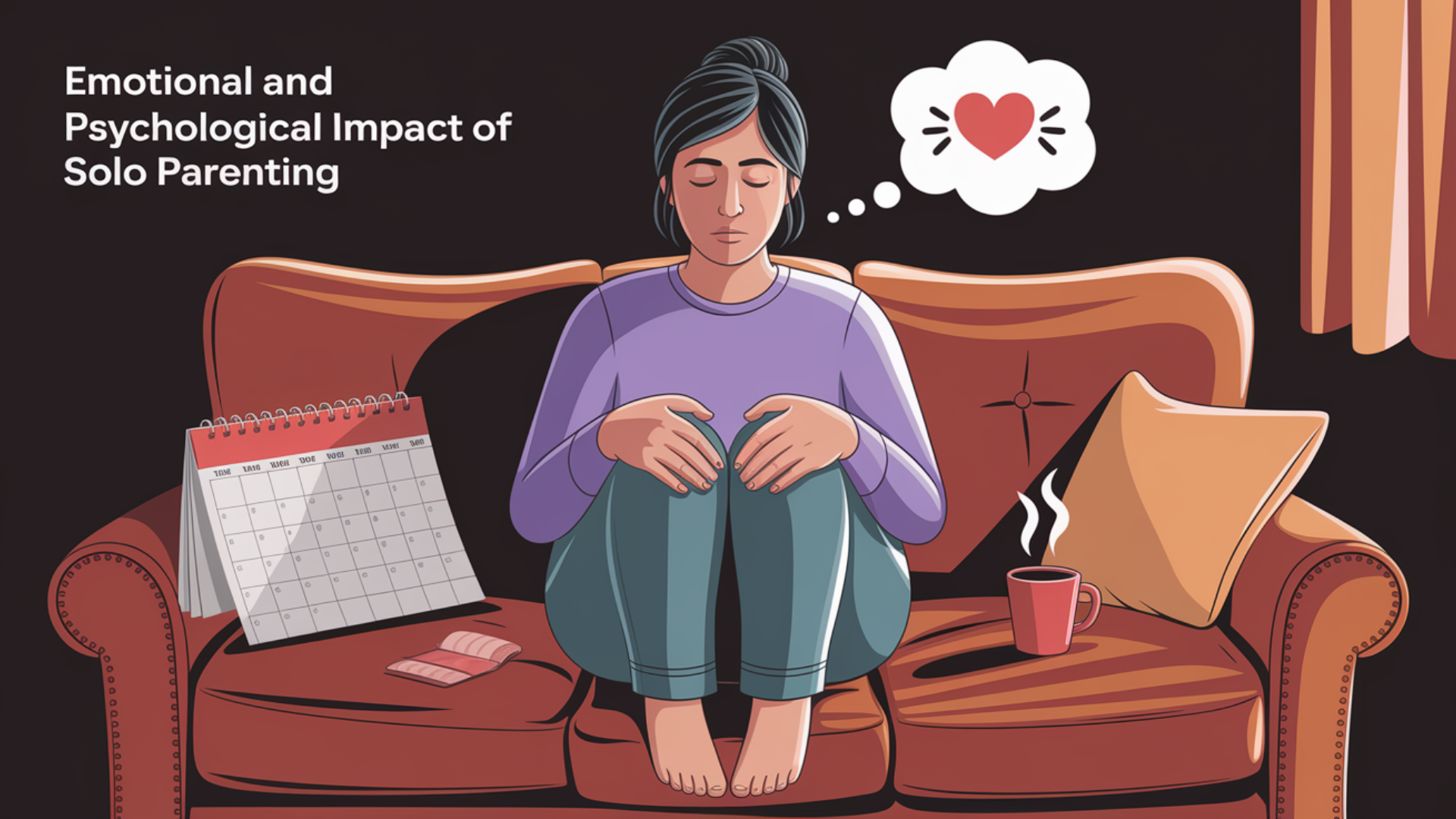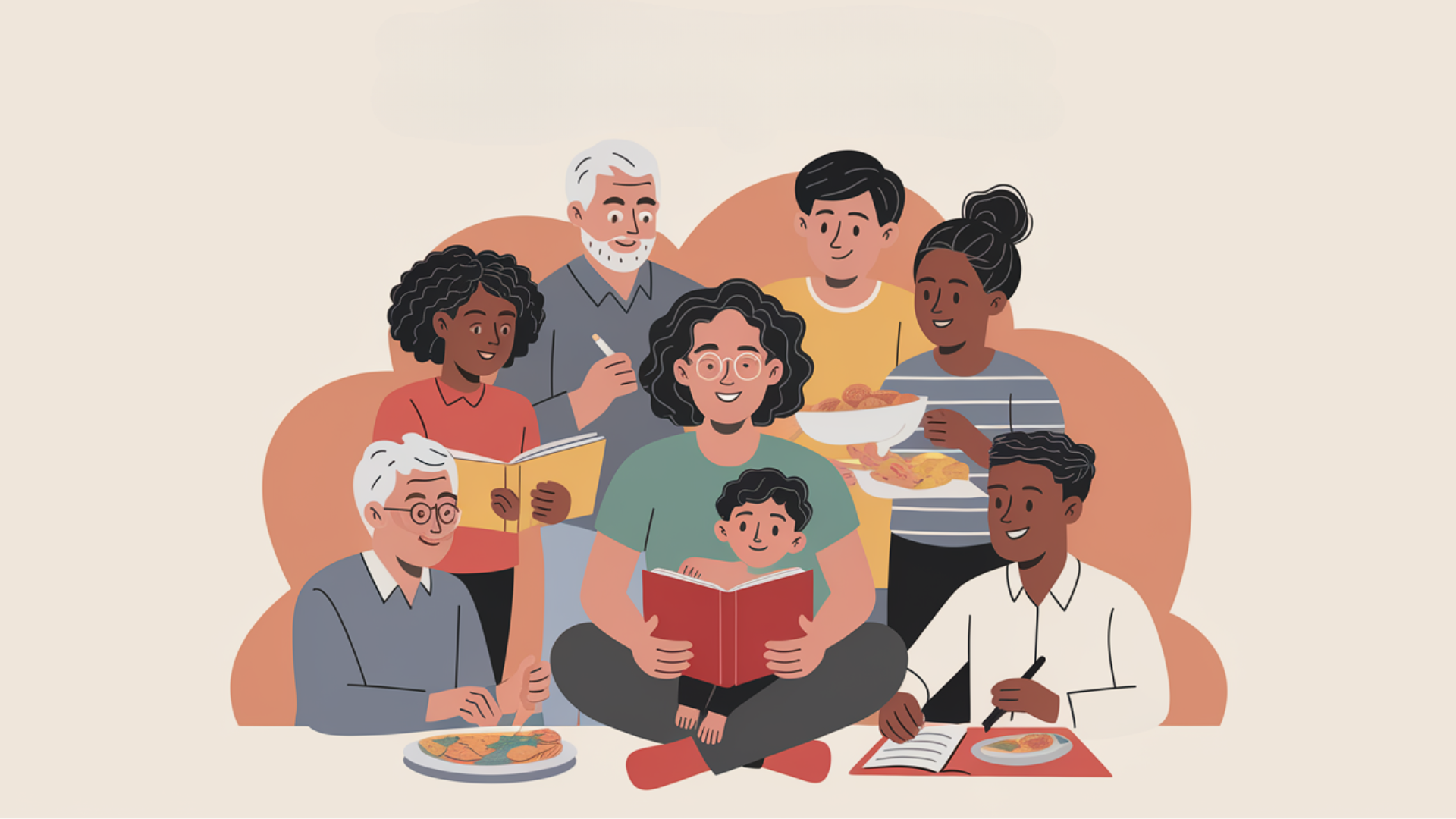
Have you ever wondered about the difference between solo parenting and single parenting? Many people confuse them, but they’re actually quite different experiences!
Solo parenting means raising a child by yourself from the very beginning. You may plan it this way because you haven’t found the right partner but want to start a family, or you feel complete on your own.
Single parenting happens when life takes an unexpected turn. Maybe you got divorced, lost your partner, or separated.
Both types of parents raise kids alone, but their starting points differ. Solo parents deal with questions about their family-building choice, while single parents face the emotions of a changed family structure.
Understanding these differences helps us support each family’s unique situation better.
What Is Solo Parenting?
Solo parenting means choosing to raise a child by yourself from the start. Unlike single parents who might have had a partner before, solo parents make a plan to parent alone right from the beginning. They take on all the roles of mom and dad all by themselves.
People choose solo parenting for many different reasons. Some haven’t found the right partner but don’t want to wait to start a family.
Others feel complete on their own and want to raise a child without the complications of a relationship. Some may have tried to have a baby with partners, but it didn’t work out, so they decided to go it alone through adoption or with help from a donor.
Solo parents face challenges, but many say the joy of creating their own family makes it all worthwhile.
What Is Single Parenting?
Single parenting means raising a child alone, without a partner to share the daily responsibilities. It’s when one parent handles all the jobs that usually two parents would share—from making meals and helping with homework to paying bills and making important decisions.
People become single parents in many different ways. Some are divorced or separated from their partner.
Others may have lost a spouse to death. Some choose to adopt or have a baby on their own. And some become single parents when their partner is away for long periods, like during military service or because of work.
No matter how it happens, single parents face unique challenges but also find special joy in their close bond with their children.
Solo Parenting vs. Single Parenting

Single parents and solo parents both raise children alone, but they arrive at this responsibility through different paths. The table below highlights the key differences in how these two parenting situations begin and unfold.
| ASPECT | SOLO PARENTING | SINGLE PARENTING |
|---|---|---|
| Origin | Planned choice from the beginning. | Often due to unexpected life changes (divorce, death, separation). |
| Involvement of Other Parent | Typically no participation from the other parent. | It may involve shared custody or ongoing involvement from the other parent. |
| Financial Planning | Financial preparation often begins before the child arrives, with sole income budgeted from the start. | May face sudden transition from two incomes to one, requiring financial adjustment. |
| Support Networks | Support systems are typically built intentionally before or during early parenting. | May rely on existing relationships that shift to accommodate new single parent status. |
| Parenting Responsibilities | Sole responsibility for all parenting duties. | May share responsibilities with the other parent. |
| Strength and Resilience | Requires strength and resilience, shaped by the decision to parent alone. | Requires strength and resilience shaped by the changes in family structure. |
Both solo and single parents face unique challenges while raising children alone. Understanding these differences helps communities provide the right kind of support to each family’s specific situation.
Emotional and Psychological Impact of Solo Parenting

Solo parents often face higher stress levels because they handle all parenting duties alone. They may feel overwhelmed juggling work, childcare, and household tasks without anyone to share the load.
Over time, this ongoing stress can lead to burnout, anxiety, or depression. Without regular breaks or support, many solo parents struggle to find time for self-care, which can affect their overall mental health.
Some solo parents report feeling isolated or lonely, especially during tough parenting moments when they wish they had someone to talk to.
Despite these challenges, many also find deep strength and satisfaction in their unique bond with their children.
The Impact of Solo and Single Parenting on Children

Children raised by solo or single parents often show remarkable resilience, though they may face unique challenges.
Their experiences depend on many factors including age, family support, and how their parent handles the situation.
- Children in both situations may sometimes feel different from their peers in two-parent families, which can affect their self-esteem or social confidence.
- Kids with single parents who experienced divorce or loss might struggle with feelings of abandonment or grief that solo-parented children typically don’t face.
- Children of solo parents may deal with questions about their origins earlier in life, while children of single parents might need to adjust to changing family structures.
- Both groups of children often develop strong independence, empathy, and problem-solving skills as they guide their family patterns.
- With proper support and open communication, children in both situations can thrive and develop healthy relationships throughout their lives.
Research shows that a loving, stable home environment matters more than family structure. Children of solo and single parents who feel secure, supported, and loved grow up to be just as happy and well-adjusted as children from two-parent homes.
The Role of Extended Family in Solo and Single Parenting

Extended family can be a lifeline for both solo and single parents. Grandparents, aunts, uncles, and close friends often step in to provide practical help, such as babysitting, rides to activities, or assistance during emergencies.
They also offer emotional support when parenting gets tough. For solo parents who plan to parent alone, these relationships may be carefully cultivated from the beginning.
In single-parent families after divorce or loss, extended family might help maintain stability during difficult transitions.
These supportive adults not only lighten the parents’ load but also give children additional loving relationships and role models to learn from.
Challenges of Parenting Alone: Solo vs. Single-Parent Experiences
Both solo and single parents face the demanding task of raising children without a partner’s support, though their trips begin differently.
Solo parents deliberately choose this path from the start, while single parents adjust to parenting alone after separation, creating distinct challenges that require different coping strategies and support systems.
Common Challenges Solo Parents Face
Solo parents take on the enormous task of raising children completely on their own by choice.
This creates unique struggles that differ from those who unexpectedly became single parents through life changes.
- Solo parents often struggle with having no built-in backup person for emergencies, sick days, or when they need a break from parenting duties.
- Finding quality childcare can be especially difficult for solo parents who don’t have a partner to share pickup, drop-off, or sick day coverage.
- Financial pressure falls entirely on one person, from daily expenses to saving for college and handling unexpected costs.
- Solo parents may experience judgment or unwanted questions about their family structure from others who don’t understand their choice.
- Building a personal support network takes extra effort since there isn’t another parent who can automatically share in decision-making or offer emotional support.
Despite these challenges, many solo parents feel tremendous pride in creating their family on their terms. With good planning and strong support networks, they find ways to thrive even when the road gets tough.
Challenges Single Parents Face After Separation
Single parents often face different obstacles as they adjust to parenting alone after previously sharing responsibilities. These challenges usually involve guiding new relationships with ex-partners while supporting children through family changes.
- Managing the emotional fallout from divorce or separation while still being a strong parent can feel overwhelming.
- Communicating effectively with an ex-partner about schedules, discipline approaches, and important decisions often creates tension.
- Children may struggle with moving between two households, leading to behavior changes that require extra patience and attention.
- Legal issues like custody arrangements, child support, and visitation schedules can be stressful and expensive to guide.
- Single parents might feel guilt about the family changes or worry about how the separation affects their children’s development and happiness.
With time and patience, many single parents develop new routines and find healthy ways to co-parent with their former partners. Children adjust best when parents can work together respectfully, even if they’re no longer together as a couple.
Parenting Solo vs. Single: Smart Strategies for Success
Both solo and single parents need practical strategies to manage their unique situations. Here are helpful approaches for each parenting experience that address their specific challenges while supporting parent well-being and child development.
Tips for Solo Parents
Solo parents can build fulfilling family lives with some planning and self-care. Creating systems of support is especially important when you’re the only parent from day one.
- To create a ” parenting village, ” connect with other parents, join solo parent groups, and build relationships with trusted friends who can help in emergencies.
- Don’t hesitate to ask for specific help when needed—whether it’s picking up groceries, watching your child for an hour, or just having someone to talk to about parenting challenges.
- Schedule regular “me time” even if it’s just 15 minutes a day—this isn’t selfish but necessary for your mental health and ability to parent effectively.
- Develop simple morning, meal, and bedtime routines to make daily life more predictable and less stressful for both you and your child.
Remember that taking care of yourself isn’t a luxury—it’s essential for being the parent you want to be. Your child benefits when you’re rested and emotionally healthy.
Tips for Single Parents
Single parents face the challenge of rebuilding family life after separation while possibly maintaining a co-parenting relationship. These strategies can help helm this complex transition.
- Focus on business-like communication with your ex-partner, keeping conversations child-centered and emotion-free when discussing parenting matters.
- When possible, create similar basic rules across both households, which helps children feel secure even when moving between two homes.
- Use shared calendars or co-parenting apps to track schedules, expenses, and important information about your children’s activities and needs.
- Reassure children regularly that both parents love them and that the divorce or separation wasn’t their fault.
With patience and consistent effort, many single parents find they can create positive relationships with ex-partners that focus on their children’s well-being, even after difficult separations.
Final Thoughts
Solo parenting and single parenting both involve raising children without a partner’s help, but they come with different challenges and joys.
Solo parents deliberately choose their path and face struggles like having no backup person and building support networks from scratch.
Single parents adjust to parenting alone after separation, dealing with co-parenting relationships and helping kids through family changes.
Both need smart strategies. Solo parents benefit from creating a “parenting village” and practicing self-care, while single parents need child-centered communication with ex-partners and consistent rules across households.
If you planned to parent alone or life led you there, remember that a loving, stable home matters more than family structure.
With good support, both can raise happy, well-adjusted children. After all, families come in all shapes and sizes—it’s the love that counts!
If you are interested in more content about motherhood and babies, feel free to click here and explore other blogs that you might enjoy.
